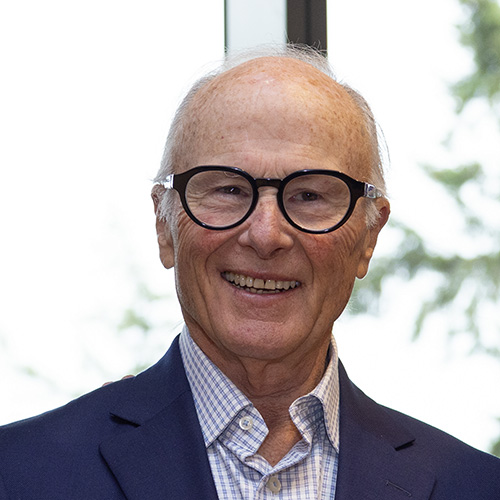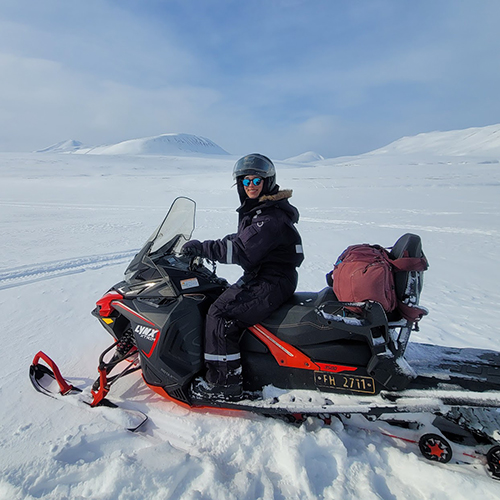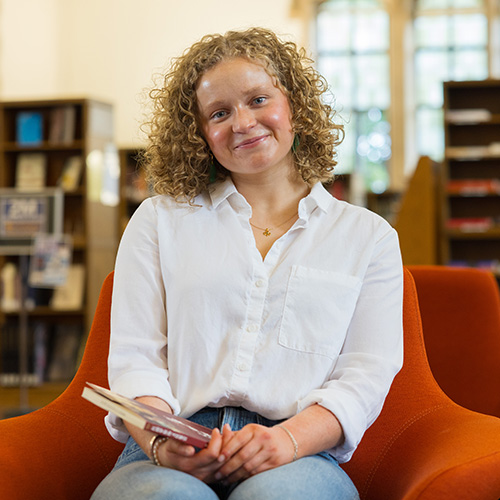When Angelina Godoy led an undergraduate seminar in
Guatemala last September, the focus was human rights. Godoy hoped her students would be moved to action by what they saw and heard in Guatemala. And they were—more than
she could have imagined.

Godoy’s course was one of 14 UW Exploration Seminars offered prior to Autumn Quarter 2005—month-long international programs that explore a topic in depth. Godoy, assistant professor of international studies and law, societies, and justice, wanted the 19 students in her seminar to study human rights issues by talking with Guatemalans who face those issues on a daily basis.
Godoy organized meetings with religious leaders, labor leaders, corporate executives, academics, sweat shop workers, coffee plantation workers, and members of a fair trade coffee cooperative. The group toured wealthy and poverty-ridden neighborhoods of Guatemala City, noting the astonishing discrepancies between the haves and have-nots. They spoke with survivors of government-led massacres of the 1980s and forensic scientists who analyze remains that have been recovered from massacres. It was not exactly lighthearted fare.
“Talking with massacre survivors was incredibly distressing,” recalls Diana Aycinena, a physics major . “It’s been twenty years, but no one gets over that.”
Tim Richards, a political science major and human rights minor, describes the trip as “exhausting work, emotionally and physically. In the evening, we spent a lot of time processing what we had seen.”
A lot of processing took place in class as well. “Students were sometimes moved to tears by their experiences,” says Godoy. “In the context of this course, that was not surprising.”
The students were responding to the wrenching nature of the Guatemalans’ stories, but also to the United States’ historical role in denying Guatemalans human rights. “By the end of the first week, the students were asking, “What is our ethical obligation now that we know this?” recalls Godoy.

Godoy provided no answers. She wanted the students to ponder the question without her influence. “I didn’t want to set up a class in which students were expected to help people from the get-go,” she says. “I felt that any effort had to be borne of the students. And that is exactly what happened.”
Throughout the remaining weeks of the class, the students knew they wanted to identify a project they could support as a group. They found such a project at a coffee plantation called San Jerónimo. The workers, who have lived on the plantation for generations in what Godoy describes as “almost a feudal system,” have been in the midst of a labor dispute with the plantation owner. The owner refused to pay the workers after the harvest in 2001; the workers took legal action but have seen no resolution due to the owner’s political influence. They still live on the plantation but have no work, no land, and no recourse. Local groups, aware of their plight, have donated food. The students wanted to do more.
“There are 65 kids on the plantation,” says Godoy. “There are public schools nearby, but there is a charge to attend—minor for us, but prohibitive for them. The students wanted to put all of those kids through school in 2006.”
The group decided on one initial activity to raise funds for the Guatemalan children: they would sell pins featuring small fabric dolls made in Guatemala. They purchased hundreds of the dolls before leaving Guatemala, then sold them on the UW campus and at Northwest gift fairs while explaining the plight of the plantation workers. They also distributed samples of fair trade coffee, having seen firsthand how fair trade cooperatives improved coffee workers’ lives.
Sales of the pins were brisk, but the students decided to think bigger.
Next they planned two fundraising events: an auction and a New Year’s Eve fundraiser. The auction, organized by students Kim-Khanh Van and Zach Snipe, was held at the New Holly Community Center in South Seattle. Latino groups participated, and Van involved the Vietnamese-American community as well. “The students pulled it off wonderfully,” says Godoy. “A kindergarten class came and sang songs, Vietnamese cultural groups performed, and the UW students spoke about their experiences in Guatemala.”
The auction raised $2,500; a New Year’s fundraiser at Jai Thai, a bar in Seattle’s Belltown neighborhood, raised another $2,200. (Jai Thai agreed to donate 100 percent of its New Year’s Eve ticket sales to the project.) Students also sent letters to family and friends, encouraging them to contribute to the cause.
By January, the students had raised $5,000 more than needed to pay for the Guatemalan children’s schooling for 2006. So they set a new goal: a scholarship to fund the education of a few motivated children through college. The goal is ambitious but not unrealistic, says Godoy. “The students feel sufficiently committed to the San Jerónimo community, and each other, that they intend to keep fundraising,” she says.
Other projects have emerged as well. Moved by a group of women in a Guatemala City squatter settlement who are working to build a community school, Diana Aycinena and Laura Felice have organized a book drive. Their long-term goal is to create a small library in the Guatemalan community.

“I helped with a similar project in Africa and knew I wanted to repeat it in Guatemala,” says Aycinena. “We needed to find a community with a contact person, a permanent location for the books, and people with a vested interest in their community. This community had all three.”
Aycinena and Felice are collecting books in English and Spanish, but plan to trade or sell the English books for additional Spanish books. “Each book will be a question—whether to sell it or bring it,” says Aycinena. “We want all the books to be useful. We’ll probably purchase some books in Guatemala as well. We know the dialect will be correct, and it will be useful to the Guatemalan economy.”
Aycinena plans to return to Guatemala in September to implement the library project. She’s not the only student with plans to revisit the country. Godoy anticipates that many of the students will return at some point, having developed an emotional connection with Guatemala.
In the meantime, Godoy is serving as a liaison between the students and Guatemalan nonprofits that are distributing the San Jerónimo education funds. “I have this great job,” jokes Godoy. “I get to give all this good news to the people in Guatemala while the students raise all the funds.”
More satisfying for Godoy is the way the students have turned their concern for Guatemala into action. Six months after the Exploration Seminar, they remain intensely committed.
“This is the best experience I’ve had as a teacher, hands down,” says Godoy. “What more could a teacher ask for?”
More Stories

A Transformative Gift for Arts & Sciences
To honor his wife and support the college that has meant so much to both of them, former Arts & Sciences dean John Simpson created the Katherine and John Simpson Endowed Deanship.

Where in the World is Arts & Sciences?
Arts & Sciences faculty, staff, and students traveled the world this summer to pursue research, study abroad, present at conferences, and more. Check out some of their adventures.

Exploring the World — and Global Careers
Study abroad in Vietnam and Madrid. An internship with the State Department. International studies major Grace Kelly explored the world as a UW student.